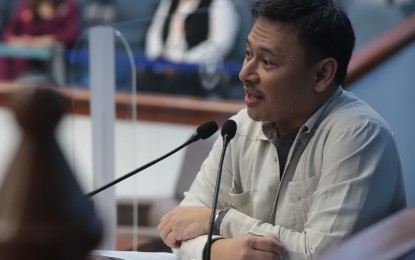
Senator Sonny Angara (Photo courtesy of Senate PRIB)
MANILA – Senator Sonny Angara on Monday sponsored the Medium-Term Fiscal Framework (MTFF) prepared by the Marcos administration's economic managers.
In a privilege speech, Angara said the MTFF’s primary objective is to stabilize the fiscal house in the short-term, without hampering the efforts at jumpstarting the country's economic recovery and sustaining growth in the medium-term.
"In that sense, the MTFF can stand as our first glimpse into the broad policy strokes that our administration wants to take that will be encapsulated and discussed more in detail in the Philippine Development Plan (PDP) 2022-2028, which is scheduled to be published by the end of this year," he said.
During the recent meeting of the Committee on Finance, chaired by Angara, with economic managers, the representatives of the Department of Finance (DOF) explained that the MTFF shall serve as the country’s blueprint, specifically for reducing the country's fiscal deficit, promote fiscal sustainability, and enable robust economic growth as the country embarks on its recovery from the Covid-19 pandemic.
Angara said the MTFF targets 6.5 percent to 7.5 percent Gross Domestic Product (GDP) growth in 2022 and 6.5 to 8 percent from 2023 to 2028; 9-percent poverty rate by 2028; 3-percent national government deficit by 2028; less than 60 percent debt-to-GDP ratio by 2025; and upper middle-income country status for the Philippines, with each Filipino earning at least USD4,256 per year, equivalent to about PHP20,000 monthly.
"Then in the near-term, the MTFF sets the following 8-point socioeconomic agenda for protecting the purchasing power of Filipinos and mitigating the socioeconomic scarring effects of the pandemic on families and consumers," Angara added, citing food security, lower transport and logistics costs, lower energy costs to families, health concerns, stronger social protection, reopening of face-to-face classes, digitalization, and sound fiscal management through tax reforms and better revenue allocation.
The MTFF also involves a longer planning horizon and sets a medium-term socioeconomic agenda focused on generating more jobs while ensuring that the jobs created have better pay, are of better quality, and are greener and more sustainable, according to Angara.
He hopes to get a better picture of the general plan once the PDP 2022-2028 is out.
The Senate Concurrent Resolution No. 3 supporting the MTFF was jointly filed by Senate President Juan Miguel Zubiri, Senate President Pro Tempore Loren Legarda, and Senate Majority Floor Leader Joel Villanueva.
Angara said it is "more or less identical" to the resolutions co-authored by House Speaker Martin Romualdez, and Representatives Manuel Jose Libanan, Marcelino Libanan, and Joey Salceda; sponsored by Marikina Representative Stella Quimbo; and adopted by the House on August 1.
The House version’s framework “specifically lays down near-term socioeconomic agenda which will continue to implement risk-managed interventions in areas of food security, transport and logistics, energy, fiscal management, health, education, social protection, and bureaucratic efficiency, to ensure the unimpeded and adequate delivery of social services, mitigate inflation pressures, accelerate economic recovery, and address economic scarring.”
The MTFF shall be subject to review and updating in three years or in 2025, prior to the 20th Congress, to reflect current economic conditions and developments, the House resolution stated.
The DOF previously said the Marcos administration’s MTFF shall steer the country back to a high-growth trajectory.
“We will work for the passage of the remaining tax reform packages of the Duterte administration, along with other key policy measures that would help accelerate our [economic] recovery,” said DOF Secretary Benjamin Diokno in two organizational briefings before the respective Committees on Ways and Means of the Senate and the House of Representatives. (PNA)
